Remeker, the king of Dutch cheeses.
This little-known Dutch cheese is one of the best in the world. We should be eating more of it.
“Our cows are in balance,” Peter says.
That’s one of the first things he tells me about making Remeker, which is, simply put, the best Dutch cheese you’ll ever taste. It’s also, conversely, a cheese you’ve probably never heard of before. I’m on the Remeker farm, where it’s sunny and muddy. Inside the barn, there are paintings of Jersey cows on the walls. Every few minutes, a tractor rumbles past the window.
“We stopped dehorning the cows, we stopped using antibiotics, we stopped feeding corn, soy and pellets, and look, I’ll show you something,” he says, pulling out his phone. “I always show this to other farmers and they don't believe it.”
Peter plays me a video of fresh manure, richly coloured and teeming with maggots. This, he tells me proudly, is extremely rare. In modern farming, livestock are plied with antibiotics because they’re exhausted from being over-milked and prone to infections. But antibiotics are ruthless, killing all microbial activity, even in manure. That means there are no nutrients for grass to absorb and it suffers. To stop pastures from dying, cows are kept indoors.
This seems absurd, a complete denaturalisation of the farming process, but that’s capitalism for you. Peter’s Jersey cows, on the other hand, are antibiotic-free and are allowed to roam (and poop) on his grass. The downside to this common sense approach is a drop in milk levels – the cows have to rest or they get sick. But just like growing grapes for wine where farmers pull back on yield to concentrate flavour, Peter’s cows now produce better, tastier milk.
This, I learn, is the kind of integrity of practice that helps make Remeker a world-class cheese. Only sold in four shops in Amsterdam plus one market, Remeker is a hard cheese with a natural rind and a buttery, floral flavour. Taste it once and you will fall in love. That’s what happened to me on a cheese walk run by Michael Jones, also known as The Cheese Lover. It was an oh my god moment, one I hope you’ll have too.
Michael’s cheese walks start at Noordemarkt, which on Saturdays is organic only. He swims through the crowds with ease, chatting cheese, telling us about the time he put together a board for King Charles. There’s nothing in the cheese world he hasn’t done or tasted. He stops us at a stall with luminous rounds of Gouda: there’s one cheese, he tells us, we have to try. He bypasses the waxy towers and reaches for something else. Remeker.
It’s then that I clock the name. I’ve had it before, at Monty’s, the sourdough toastie place in de Jordaan. There it’s mixed with two Montgomery cheeses, a cheddar and an Ogleshield, which are made in the UK, a mix that gives the toasties serious complexity.
Back at a wine bar, Michael tells us about his three Cs: cheese with character and complexity. That’s what he looks for. Most Dutch cheeses are wrapped in inedible, plastic wax, which reduces evaporation during aging. Historically, this meant a cheese wouldn’t lose any weight, which meant more profit for the seller as price was negotiated per kilo. In practice, hermetically sealing cheeses with wax means they develop less character as they mature. They’re a one-note product.
When we taste a Gouda next to the Remeker, the difference in flavour is remarkable. The Gouda is fine, but Remeker is nutty, creamy, salty, sweet. They’re not even close in profile. In a way, I feel bad for Gouda, which is something of a national emblem: on landing at Schipol, one of the first things that makes me feel at home is seeing the stacked, rubbery pucks of Gouda sold in airport shops.
What differentiates Remeker from other cheeses in the Netherlands is its natural rind, which allows air to pass back and forth, leading to aging and complex flavours. Michael urges us to eat the rind. For him, it’s the best part. He’s not wrong, it’s loaded with flavour. Cubing cheese so that it’s rindless is the worst thing you can do, he argues.
I put up my hand. Why is there a Gouda monoculture in the Netherlands? Michael says that consumers simply buy what they know. He even experienced this at his cheese shop, which he ran for 18 years. He says it’s the same in the UK with cheddar. While that might be true, I’ve seen artisan, British cheese explode in popularity in the UK: Montgomery cheeses appeared on every menu in the 2010s. In Amsterdam, the revolution feels slower. Is there something about the Dutch psyche that results in a Gouda hegemony? Frugality, perhaps?
“They know they make good cheeses but they don’t see them as exceptional,” Michael suggests. “Not like they do French and Italian cheeses.”
They really should. There are plenty of raw milk, non-waxed cheeses to enjoy, if you know where to look. Back on the farm, Peter shows me the aging rooms, where thick wheels of Remeker are stacked up high. The shelves feel grand, a little magical even, like a library in wizard’s castle. I ask him what he thinks about the cheese market in the Netherlands, if he’s noticing a shift towards better products made with care.
“Yes, I’ve got a lot of customers who are looking for something special.” But that sense of special is something he’s also looking to protect. He won’t sell the cheese to a wholesaler, only direct to shops, which helps him guard his price and therefore his business’ integrity.
“People are buying good or buying cheap… it’s the middle part that’s falling away,” he says, referring to a consumer habit known as the Lipstick Effect. People will spend more on smaller luxuries in times of economic hardship rather than shell out on big things, like cars and houses. This is evident in bakeries: people are happy to buy an expensive, beautifully made pastry, a smaller gift to oneself when bigger assets feel increasingly out of reach.
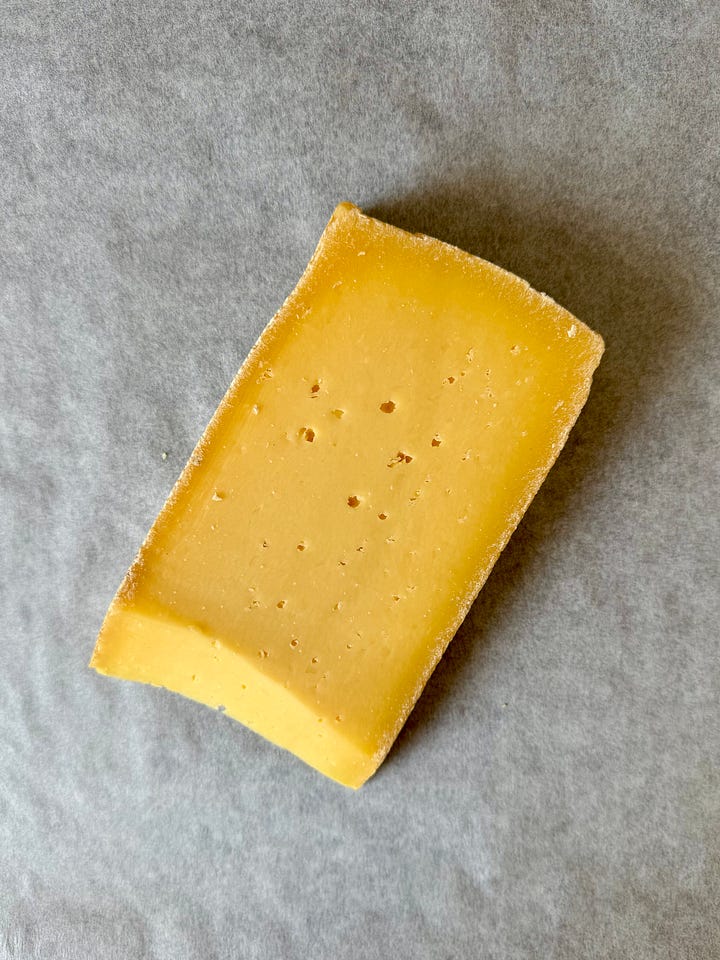
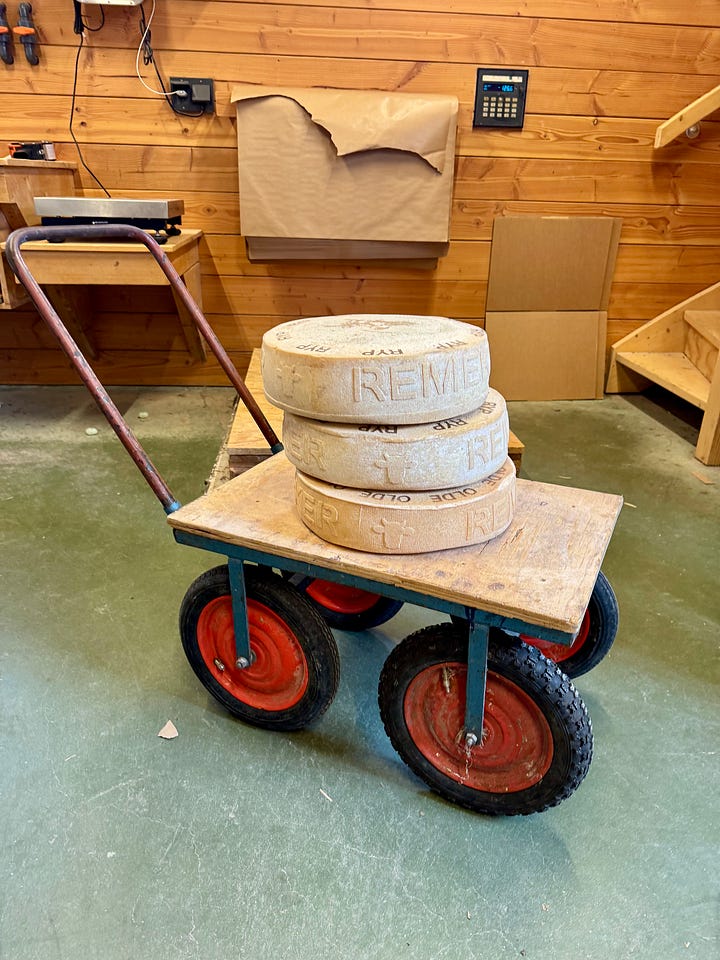
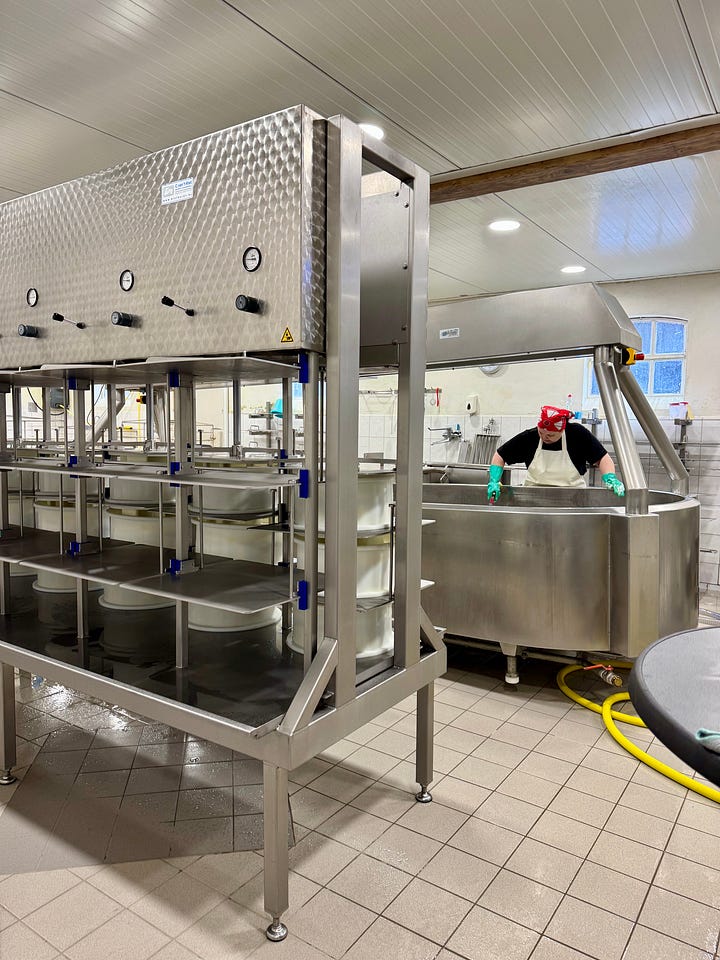
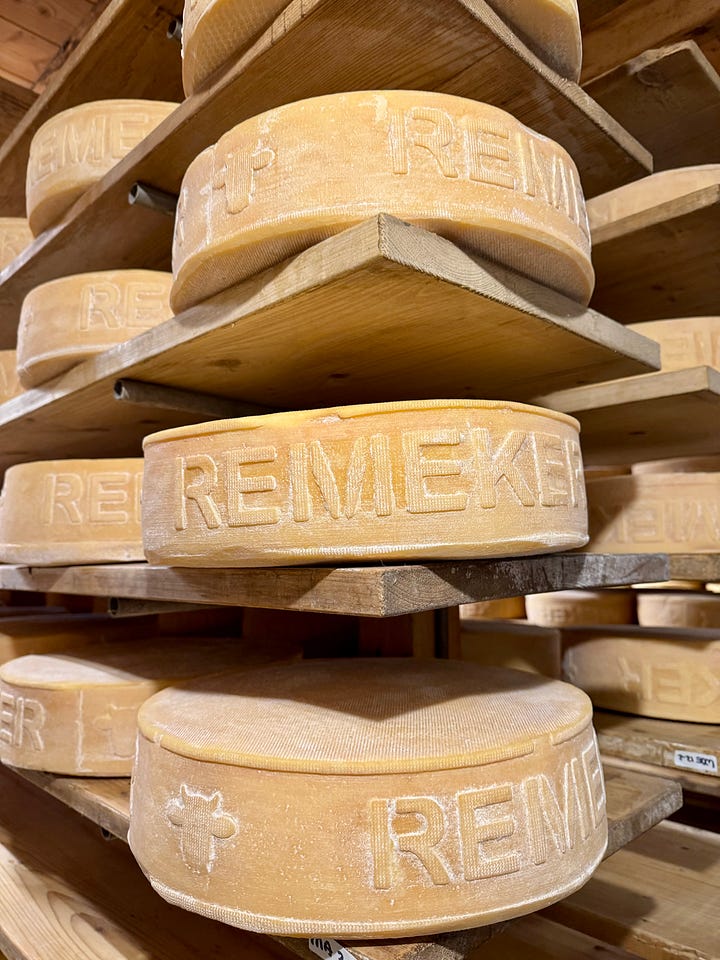
Is there anything else that makes Remeker taste so good? “The bacteria,” Peter says. They’ve run tests and found the same strains of bacteria in both his cheese and his soil. “If we made cheese 50 kilometres that way, we’d have a very different type.” Terre noire then, but for cheese. By the same token, being bound to the land means he can’t aggressively expand. He’s also limited by his Jersey cows, the first of the breed to be introduced to the Netherlands. Jersey cows produce milk with a higher fat content, which is better for cheesemaking, but to rear them organically takes time. Even then, his herd can only grow to 112, the maximum allowed by law.
“We have to grow organically. Small, small steps.” Organic in farming, organic in practice, I’m beginning to understand. Peter doesn’t seem stressed about going slow: if his cows live in balance, then Peter does too – or at least he tries to, it’s evident he works exceptionally hard. He sees many cheesemakers quitting the industry, having never even taken a day’s holiday. When he was younger, he said no to taking over the family farm. Obviously, that changed. But by slowing down his cows’ milk production to more natural levels, he’s also slowed the onslaught of work for himself, which in turn gives him more time for things like holidays with his family. If that means less profit, so be it.
George, who runs Monty’s with his partner Cress, neatly sums it up: “Remeker is a business still, but it's not business first.” The same can be said of Monty’s, which simply wants to make you an exceptional toastie. “Remeker are the definition of best practices. They’re truly not using any pesticides or anything artificial… they’ve built an entire ecosystem instead.” I completely agree, but I’ve learnt that ecosystem involves its people too. To be a good food producer, you need to respect the ingredient, the animal, the land – but also yourself, and your time.
Did George ever consider using Gouda in the toastie? “No. The biggest turnoff for me was peeling the plasticky wax rind from the cheese, which is painted on. It just feels so wrong.”
We agree that Gouda isn’t a bad cheese at all (I still frequently eat it) but it’s fair to say it monopolises the cheese scene even as properly made cheeses like Remeker are quietly becoming some of the best in the world. When George and Cress first tried Remeker, they just knew it was the cheese to complete their toastie. And not just for the flavour but also for the philosophy.
In the end, that philosophy is the vein in the cheese that connects it all. To make a product with integrity, you have to, on some level, reject the pursuit of profit. It’s about living slower, being in balance. That balance starts with the cows – treat them well, and good begets good. Farmers like Peter are wanting to teach us that. We should be listening.
—
Remeker is available to purchase from:
Noordermarkt on Saturdays.
OK BYE!
To get the most out of Smaak and to support my writing, please consider becoming a paid subscriber. You’ll get access to paywalled articles and The Index, a list of all my top recommendations. Thank you so much!





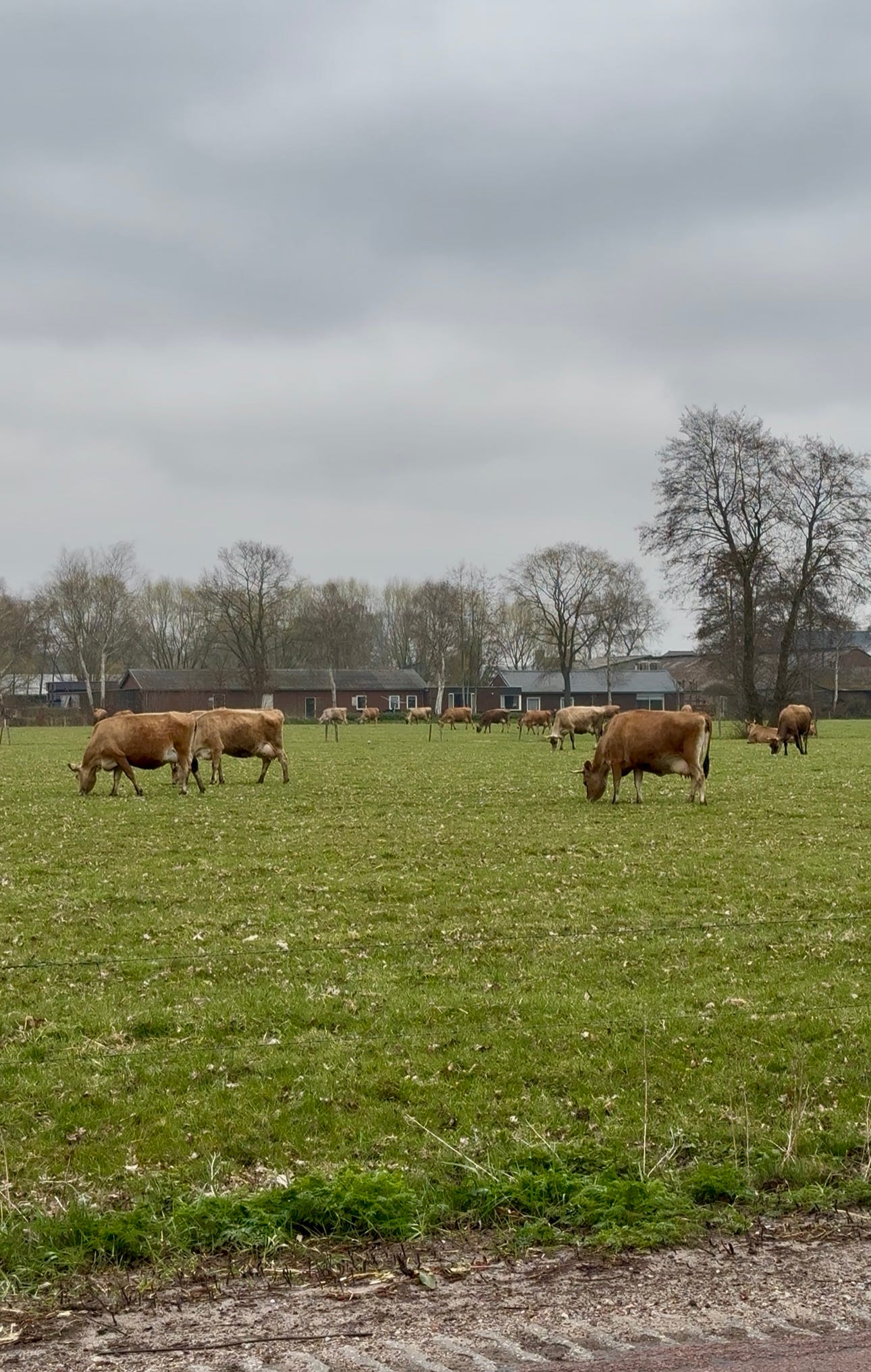
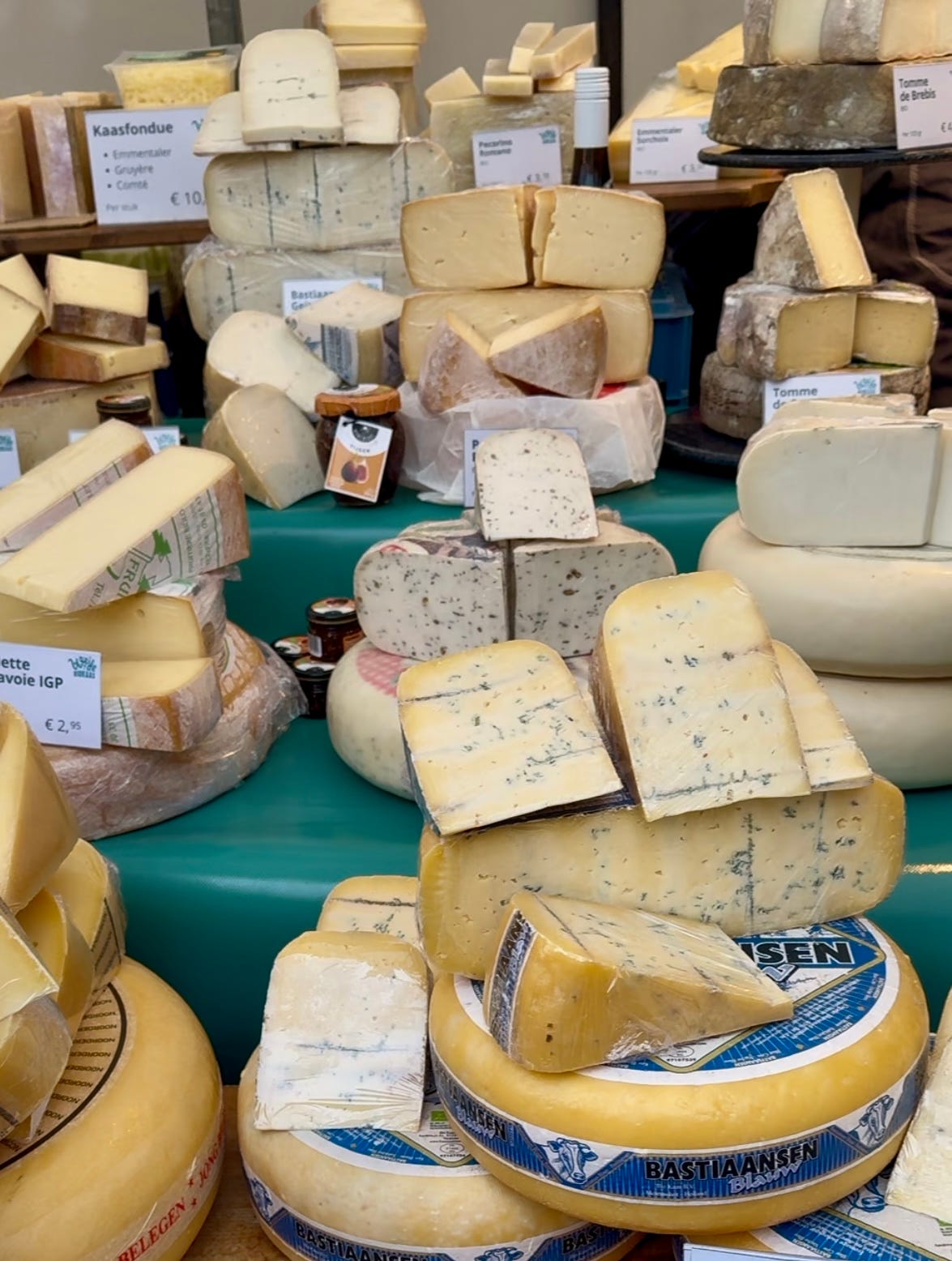
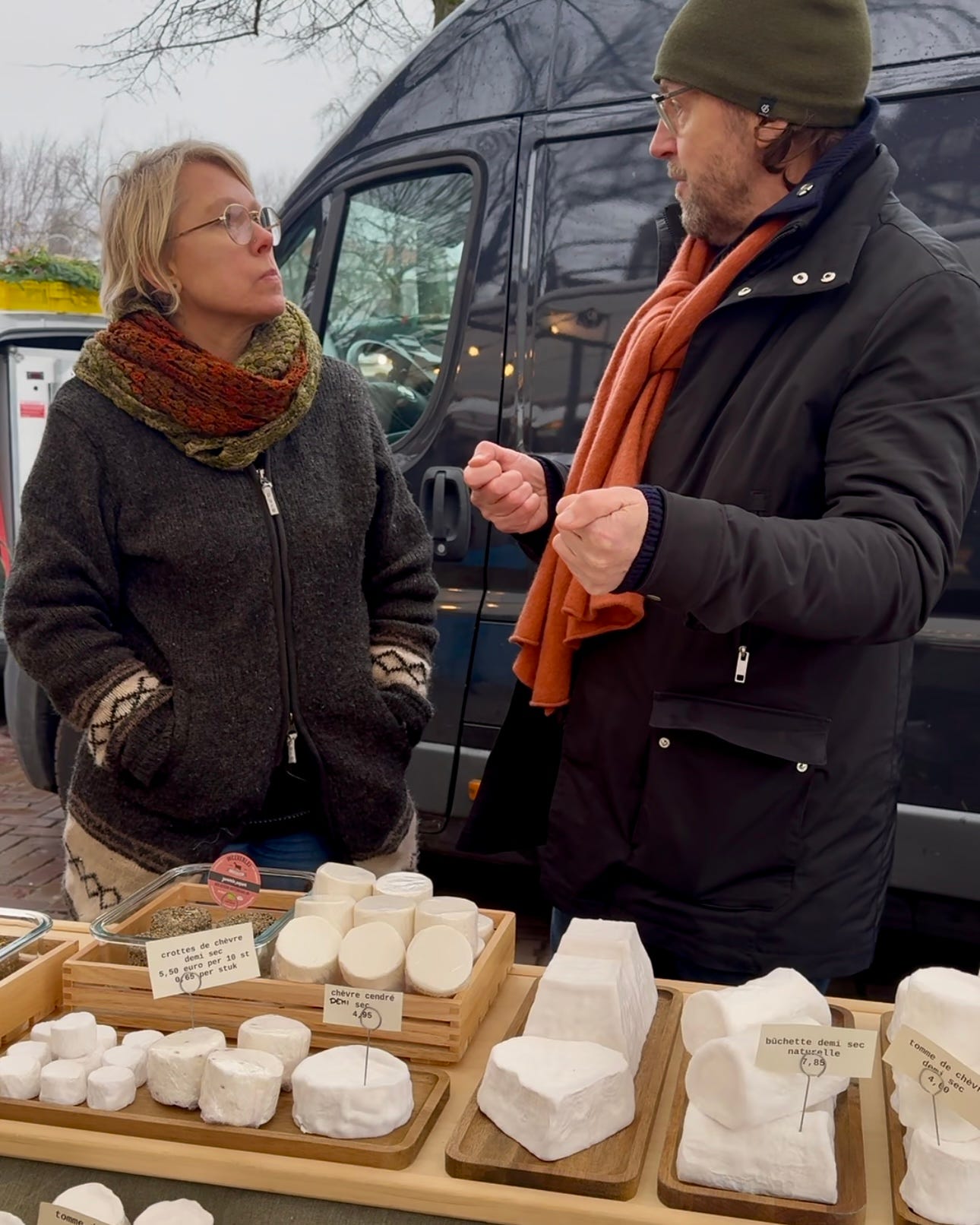
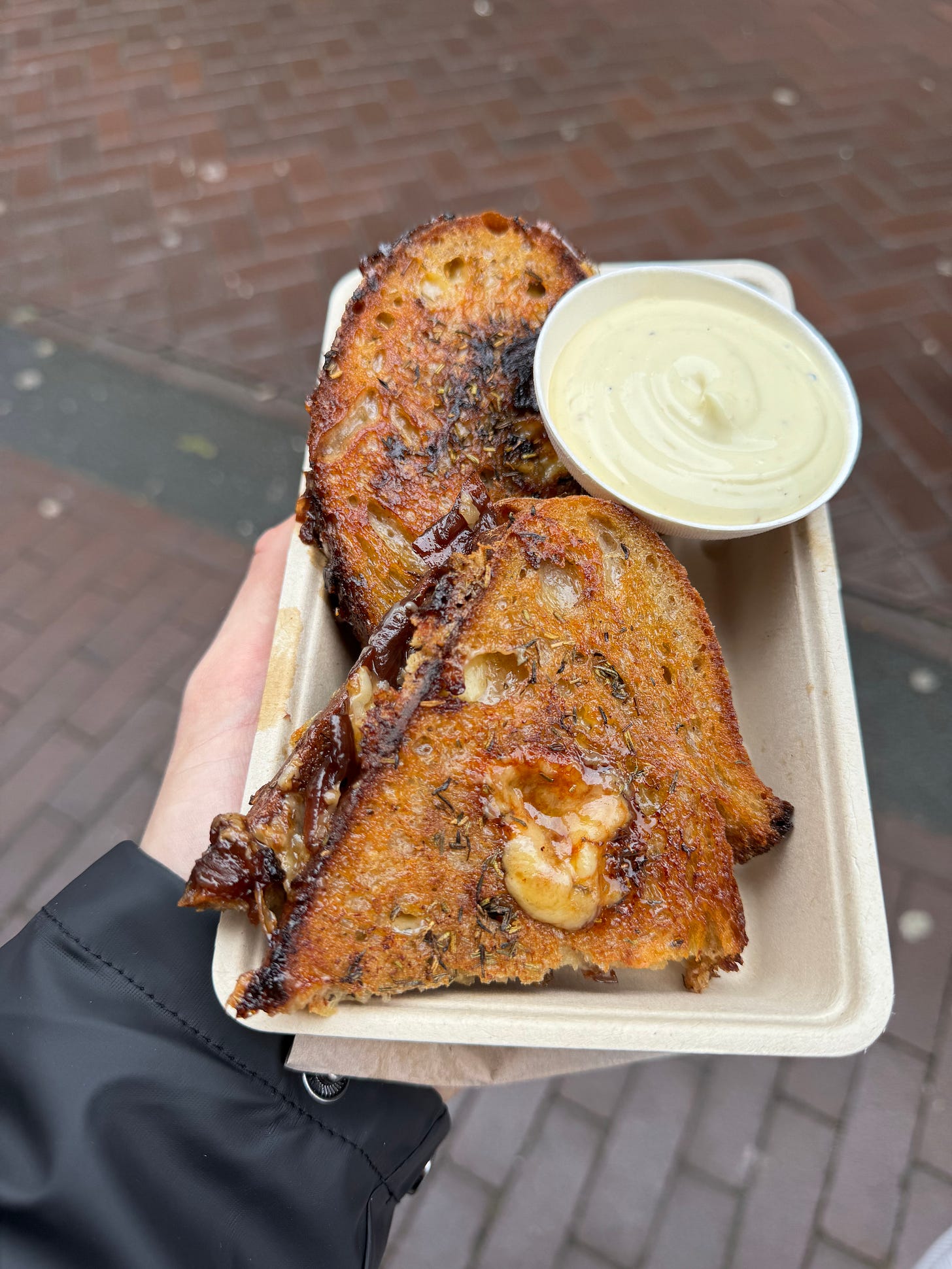
Brilliant article. Having lived in uk for 16 years it’s one thing I think I miss the most! While I appreciate the Dutch no-nonsense practicality in most areas of life, I really wish they had a more demanding and less pragmatic attitude to food in general.
Makes me wish I was in Amsterdam!